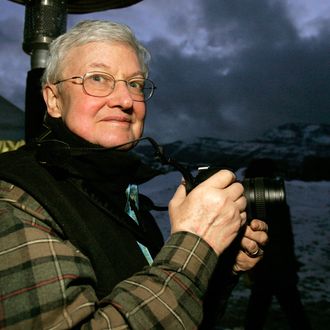
He announced that he would be taking a “leave of presence” on the day before his death — a peculiar formulation. But Roger Ebert wanted like hell to stay with us. He was, foremost, a public man in a private profession, the Mayor of Movie Critic-Ville, closer on the spectrum to an ambassador than, say, his pugnacious Chicago colleague, Jonathan Rosenbaum. He gave encouragement to younger critics, started a festival (Ebertfest) for films he thought deserved attention, reinvented himself when the pain would have made a lesser man throw in the towel.
Although a fast and lively writer in his early days (good enough to win a Pulitzer, if prizes are your thing), Ebert achieved his greatest success as a TV talker, an amazingly lucid one. He had the ability more than anyone I’ve seen to talk — to think — in whole paragraphs, knowing from his first sentence what his last would be, framing his ideas with masterly simplicity. His work was accessible to people who normally had no patience for critics, for whom critics were fey droppers of opinions, insult kings, elitists. Ebert purged his elitist airs and said, “I’ll know what you like because I’m just like you. And we all live through movies.”
Few of his fans remember the early Ebert, the one who drank heavily and spent evenings with women at the Playboy mansion and liked Russ Meyer films with big-boobed women so much that he wrote a particularly nutty one, Beyond the Valley of the Dolls. When he sobered up, he developed a new agenda.
Ebert’s Pulitzer loomed large in the early days of his TV show, Sneak Previews. It gave him a legitimacy that distanced him from Joel Siegel and Gene Shalit and other reviewers with facial hair. At first, a lot of us thought the show was entertaining for all the wrong reasons. We tuned in to watch Ebert and Gene Siskel bicker. Siskel was prickly and scattershot and Ebert could barely conceal his contempt for his co-star’s fuzzy thinking. But he was always able to keep their discussions on course — or at least to cut them short in ways that made us laugh. And the show got better. More important, kids who grew up seeing movies through the prism of Ebert and Siskel’s discussions were drawn in. The pair became a model for how to talk about a work of art without just spouting opinions. They went from “the fat guy and the other one” (and, in the George Lucas-produced Willow, a deadly creature called the Eborsisk*) to, well, Ebert and Siskel, celebrities in their own right.
Ebert wasn’t known for a particular aesthetic, though in his early days he was close to Pauline Kael. His public-oriented approach was in some ways a limitation. As a caretaker of moviegoer’s hygiene, he didn’t just attack slasher films — he also spurned such American originals as Blue Velvet.
But then came the cancer, the removal of his jaw, the loss of his ability to eat (which he loved) and hold forth (which he loved as much). But this cursed event was in some respects a gift. As a film blogger, he was peerless, and he was, if anything, better on politics and social issues than on movies. On Twitter, he found the kind of direct line to the public he’d never had before. He loved the community, the interchanges both respectful and feisty, the instant feedback. What an irony: Lacking the power of his speech, he was still in his element.
A “leave of presence,” indeed. More than any individual thing he wrote, Ebert’s legacy is his presence.
* The name of the Willow character has been corrected from “Siskbert,” which was the shorthand with which many would refer to the team of Siskel & Ebert.


